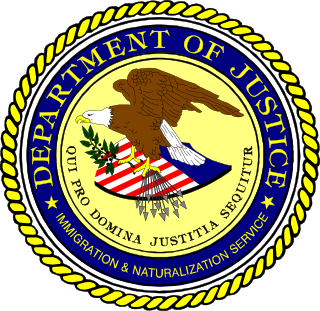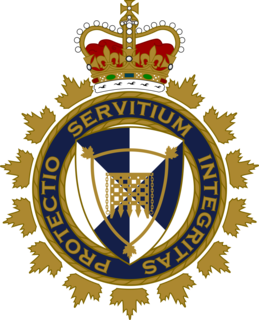
The Racketeer Influenced and Corrupt Organizations Act, commonly referred to as the RICO Act or simply RICO, is a United States federal law that provides for extended criminal penalties and a civil cause of action for acts performed as part of an ongoing criminal organization. The RICO Act focuses specifically on racketeering and allows the leaders of a syndicate to be tried for the crimes they ordered others to do or assisted them in doing, closing a perceived loophole that allowed a person who instructed someone else to, for example, murder, to be exempt from the trial because they did not actually commit the crime personally.

The United States Immigration and Naturalization Service (INS) was an agency of the U.S. Department of Labor from 1933 to 1940 and the U.S. Department of Justice from 1940 to 2003.

The Navigation Acts, or more broadly The Acts of Trade and Navigation were a long series of English laws that developed, promoted, and regulated English ships, shipping, trade, and commerce between other countries and with its own colonies. The laws also regulated England's fisheries and restricted foreigners' participation in its colonial trade. While based on earlier precedents, they were first enacted in 1651 under the Commonwealth. The system was reenacted and broadened with the restoration by the Act of 1660, and further developed and tightened by the Navigation Acts of 1663, 1673, and 1696. Upon this basis during the 18th century, the acts were modified by subsequent amendments, changes, and the addition of enforcement mechanisms and staff. Additionally, a major change in the very purpose of the acts in the 1760s — that of generating a colonial revenue, rather than only regulating the Empire's trade — would help lead to revolutionary events, and major changes in implementation of the acts themselves. The Acts generally prohibited the use of foreign ships, required the employment of English and colonial mariners for three quarters of the crews, including East India Company ships. The acts prohibited the colonies from exporting specific, enumerated, products to countries and colonies other than those British, and mandated that imports be sourced only through Britain. Overall, the Acts formed the basis for English British overseas trade for nearly 200 years, but with the development and gradual acceptance of free trade, the acts were eventually repealed in 1849. The laws reflected the European economic theory of mercantilism which sought to keep all the benefits of trade inside their respective Empires, and to minimize the loss of gold and silver, or profits, to foreigners through purchases and trade. The system would develop with the colonies supplying raw materials for British industry, and in exchange for this guaranteed market, the colonies would purchase manufactured goods from or through Britain.

The U.S. Immigration and Customs Enforcement (ICE) is a law enforcement agency of the federal government of the United States tasked to enforce the immigration laws of the United States and to investigate criminal and terrorist activity of transnational organizations. ICE has two primary components: Homeland Security Investigations (HSI) and Enforcement and Removal Operations (ERO).
A writ of assistance is a written order issued by a court instructing a law enforcement official, such as a sheriff or a tax collector, to perform a certain task. Historically, several types of writs have been called "writs of assistance".The Writs of Assistance was finally published in October 6, 1763. Most often, a writ of assistance is "used to enforce an order for the possession of lands". When used to evict someone from real property, such a writ is also called a writ of restitution or a writ of possession. In the area of customs, writs of assistance were first authorized by an act of the English Parliament in 1660, and were issued by the Court of Exchequer to help customs officials search for smuggled goods. These writs were called "writs of assistance" because they called upon sheriffs, other officials, and loyal subjects to "assist" the customs official in carrying out his duties.

The Townshend Acts were a series of British Acts of Parliament passed during 1767 and 1768 and relating to the British in North America. The acts are named after Charles Townshend, the Chancellor of the Exchequer, who proposed the program. Historians vary slightly as to which acts they include under the heading "Townshend Acts", but five acts are often mentioned:

The United States Customs Service was an agency of the U.S. federal government that collected import tariffs and performed other selected border security duties.

The Canada Border Services Agency is a federal agency that is responsible for border protection and surveillance, immigration enforcement and customs services in Canada. The CBSA is accountable to Parliament through the Minister of Public Safety and Emergency Preparedness

The Sugar Act, also known as the American Revenue Act or the American Duties Act, was a revenue-raising act passed by the Parliament of Great Britain on 5 April 1764. The preamble to the act stated: "it is expedient that new provisions and regulations should be established for improving the revenue of this Kingdom ... and ... it is just and necessary that a revenue should be raised ... for defraying the expenses of defending, protecting, and securing the same." The earlier Molasses Act 1733, which had imposed a tax of six pence per gallon of molasses, had never been effectively collected due to colonial evasion. By reducing the rate by half and increasing measures to enforce the tax, the British hoped that the tax would actually be collected. These incidents increased the colonists' concerns about the intent of the British Parliament and helped the growing movement that became the American Revolution.

United States Customs and Border Protection (CBP) is the largest federal law enforcement agency of the United States Department of Homeland Security, and is the country's primary border control organization. It is charged with regulating and facilitating international trade, collecting import duties, and enforcing U.S. regulations, including trade, customs, and immigration. CBP is one of the largest law enforcement agencies in the United States. It has a workforce of more than 45,600 sworn federal agents and officers. It has its headquarters in Washington, D.C.
Confiscation is a legal form of seizure by a government or other public authority. The word is also used, popularly, of spoliation under legal forms, or of any seizure of property as punishment or in enforcement of the law.
A racket is an organized criminal act, usually in which the criminal act is a form of business or a way to earn illegal money regularly or briefly but repeatedly. A racket is often a repeated or continuous criminal operation. Originally and often still specifically, a racket was a criminal act in which the perpetrator or perpetrators fraudulently offer a service to solve a nonexistent problem, a service that will not be put into effect, or a service that would not exist without the racket. Conducting a racket is racketeering. Particularly, the potential problem may be caused by the same party that offers to solve it, but that fact may be concealed, with the specific intent to engender continual patronage for this party.

A border guard of a country is a national security agency that performs border security, i.e., enforces the security of the country's national borders. Some of the national border guard agencies also perform coast guard and rescue service duties.

The Boston Tea Party was a political and mercantile protest by the Sons of Liberty in Boston, Massachusetts, on December 16, 1773. The target was the Tea Act of May 10, 1773, which allowed the British East India company to sell tea from China in American colonies without paying taxes apart from those imposed by the Townshend Acts. American Patriots strongly opposed the taxes in the Townshend Act as a violation of their rights. Demonstrators, some disguised as Native Americans, destroyed an entire shipment of tea sent by the East India Company.
The American Mafia or Italian-American Mafia is a highly organized Italian-American criminal society. The organization is often referred to by members as Cosa Nostra and by the government as La Cosa Nostra (LCN). The organization's name is derived from the original Mafia or Cosa nostra, the Sicilian Mafia, and it originally emerged as an offshoot of the Sicilian Mafia; however, the organization eventually encompassed or absorbed other Italian-American gangsters and Italian-American crime groups living in the United States and Canada that are not of Sicilian origin. It is often colloquially referred to as the Italian Mafia or Italian Mob, though these terms may also apply to the separate yet related organized crime groups in Italy.

The Buenos Aires Customs House (Aduana) is a government building and architectural landmark in the Montserrat section of Buenos Aires.
Operation Power Outage was a law enforcement sting operation targeted at arresting and indicting members of the Armenian American criminal group Armenian Power operating in the United States. The group is accused of racketeering offenses, bank fraud schemes, kidnappings, and drug trafficking. Armenian Power which originated 20 years ago in East Hollywood and has over 200 members, has developed from a street gang into an international criminal organization.
The Nine Trey Gangster Bloods are a set of the United Blood Nation street gang, the latter of which is a set of the Bloods street gang. The gang was established in 1993 at the Rikers Island jail complex in New York City, and operates on the East Coast of the United States. The gang has operated in the U.S. state of Virginia and other states. It has allegedly been engaged in the sex trafficking of women and racketeering in Virginia, New York, North Carolina, Baltimore, New Jersey and other areas. The gang was also allegedly involved in the distribution of illegal drugs, including heroin, cocaine, crack, ecstasy, marijuana and prescription painkillers in these areas. Further allegations include dealing in counterfeit U.S. currency and using counterfeit currency to "finance wholesale drug purchases".

Project Shadowfire was an American police investigation in early 2016 that resulted in the arrest of 1,133 people, 915 of whom are suspected members of "multinational organized criminal gangs", involved in murder, racketeering, drug smuggling and human trafficking from Mexico and elsewhere. The majority of the arrests took place in Los Angeles and San Francisco in California; El Paso and Houston, Texas; Atlanta, Georgia, and San Juan, Puerto Rico. More than twenty kilos of narcotics, about $70,000, and 150 firearms were also seized.

Operation Community Shield is an ongoing multi-agency law enforcement initiative targeting violent gang members and their associates involved in the illegal drug and human trafficking industries in the United States. Since its launch by U.S. Immigration and Customs Enforcement (ICE) in February 2005, Homeland Security Investigations (HSI) and other participating federal, state and local law enforcement agencies have made more than 40,000 gang-related arrests, including 451 gang leaders, representing more than 2,400 different gangs and organizations, and have seized more than 8,000 guns in multiple projects.














